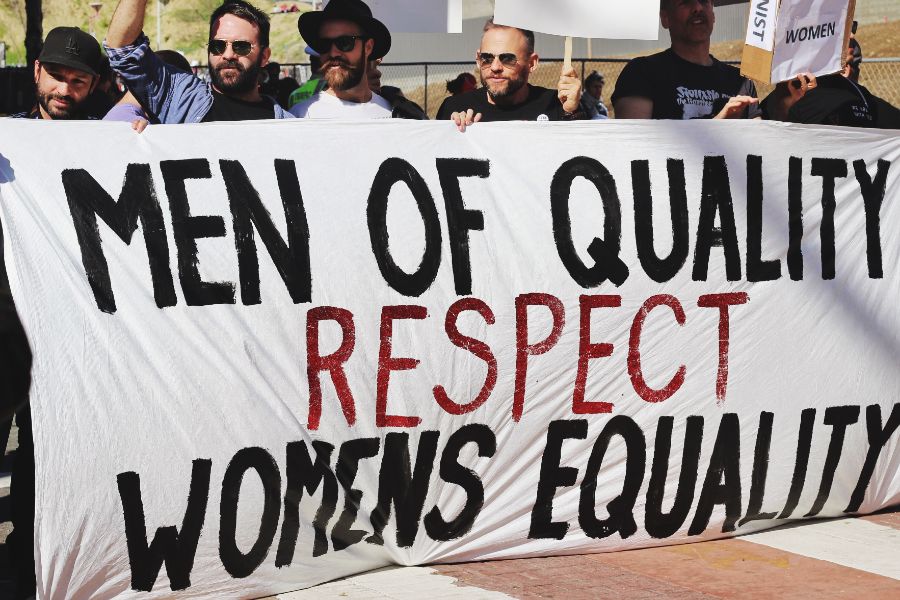The views expressed in our content reflect individual perspectives and do not represent the authoritative views of the Baha'i Faith.
“The world of humanity has two wings—one is women and the other men,” wrote Abdu’l-Baha, one of the central figures of the Baha’i Faith. “Not until both wings are equally developed can the bird fly. Should one wing remain weak, flight is impossible.”
Right now, humanity’s flight (i.e. progress, success, and prosperity) remains impossible, because we still have not achieved the equality of women and men. Around the world, women are denied basic human rights such as equal pay, equal access to education, and protection from sexual harassment and assault.
RELATED: In Pursuit of Equality: 100 Years of Women’s Suffrage
Sexism is depressing, painful, and debilitating. And if you’re a woman of color, the added trauma of experiencing racism in addition to sexism is even more severe. So, we need everyone to stand up and advocate for justice, rights, and equality for women everywhere.

Being a woman’s rights advocate is about more than just participating in a march or lobbying Congress. It involves being a staunch ally for the women in your life and working for real, positive change in your spheres of influence. Here are five simple ways you can start advocating for women today.
1. Become Aware of Sexist Stereotypes
Become a conscious observer of the media and notice what sexist stereotypes are being shown in the advertisements, movies, TV shows, or music videos you watch. Observe how often women are objectified and depicted in sexually submissive roles. And, if women are seen as both beautiful and intelligent and occupy positions of leadership, notice how these women are often portrayed as bossy, cruel, or cutthroat.
In a talk in 1912, Abdu’l-Baha explained how many of these sexist attitudes arise from this idea that women were “created for rearing children and attending to the duties of the household. If she pursued educational courses, it was deemed contrary to chastity…” So, people believed that it was best for women to be ignorant. Women are, unfortunately, more likely to be treated with hostile sexism when they defy these gender roles and stereotypes. In addition, note how women of color are portrayed differently than white women. For example, if Black women are not depicted as the mammy stereotype, they are often portrayed as angry, sassy, unmannerly, or promiscuous.
Stereotypes are dangerous. They support the beliefs that women are inferior and should be treated as such, especially when they go unnoticed. So, if you’re in company when you notice these stereotypes, speak up and have a dialogue about this. Perhaps you may want to stop supporting certain programs or help create new ones that portray women in a positive light.
2. Think About What Sexist Views You May Have
Baha’u’llah, the prophet and founder of the Baha’i Faith, wrote that we should bring ourselves “to account each day.” Before you can combat sexism in society, you need to first address it within yourself. This requires reflecting about what type of subconscious sexist thoughts or views you may have.
Do you have more benevolent sexist views that women are fragile, incompetent, and defenseless? Or do you have more hostile sexist views that women are power hungry, easily offended, and sexually manipulative? Are your interactions with white women different from your interactions with women of color? We can’t better the world without first improving ourselves and our interactions with others. Remember, you don’t have to be a man to have sexist views about women. Women can have internalized sexism as well.
3. Defend the Women Around You
The Baha’i writings say we should all be “the helpers of every victim of oppression.” Abdu’l-Baha also wrote, “Let him improve the character of each and all, and reorient the minds of men.” Whenever you witness any sexist attitudes, comments, or behaviors, it’s important to speak up and defend the women around you.
For example, women’s perspectives are often ignored in the workplace. I was told a story of how a woman was feeling frustrated, because she would often share ideas in staff meetings, but her team would just ignore them. But if a male coworker shared the exact same idea, he would be praised and listened to. Advocating for women involves calling attention to what they have to say and making sure they are heard and valued.
4. Initiate Honest Conversations With Women
The Baha’i writings say that we should “do some good to every person” who crosses our path and “be of some benefit” to them. If you aren’t a victim of sexsim, it’s easy for your own sexist behavior to go unnoticed.
So, if you’d like to be an advocate for the women in your life, it’s helpful to initiate honest conversations with those who are close to you and ask how you can be their advocate. Reassure the women in your network that you want them to tell you when they perceive any sexist behavior from you. If you learn that you’ve treated a woman with sexism in the past, you may want to apologize and ask how you can make amends.
5. Support Causes for Women
The Baha’i writings say that we should be the “patrons of the disadvantaged.” There are so many wonderful organizations out there that are actively fighting against gender suppression and discrimination.
The Baha’i-inspired Tahirih Justice Center, for example, is an excellent national organization that is dedicated to ending violence against women and girls through education, services, and policy advocacy. These organizations are often looking for help to further their reach and impact. We can support them by donating, volunteering, and raising awareness of their causes.
















Comments
Sign in or create an account
Continue with Googleor